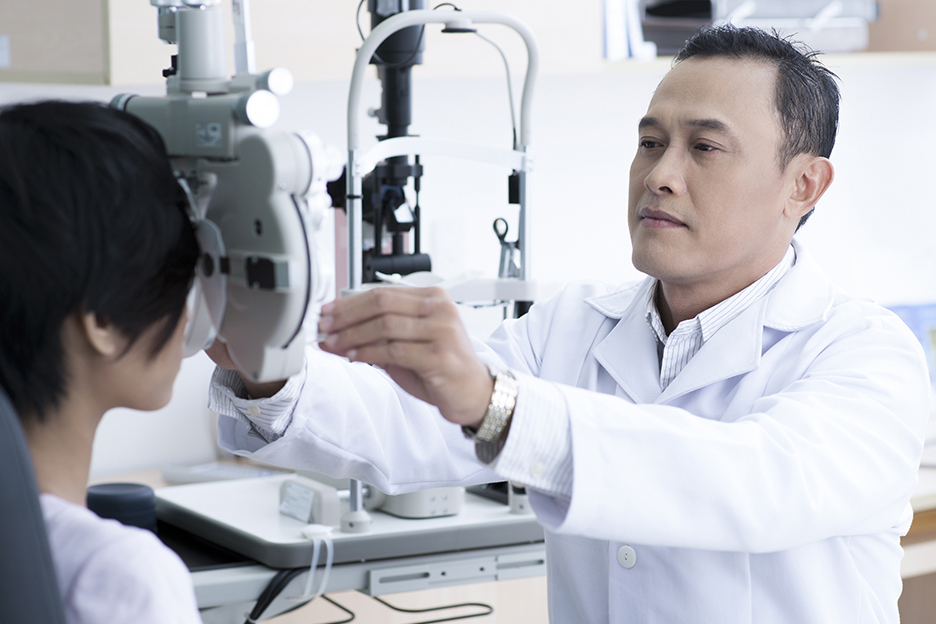Your view of things is based on several factors, including how well you see. One of the most frequent eye problems affecting us is glaucoma. Here are just a few tips that will shed some light on this all too frequent illness.

Protecting your senses guarantees your quality of life!
Our eyes equal vision as much as our skin equals touch... just think a minute about what our daily life would be like without these high precision visual tools. Regardless of their colour, shape and effectiveness, your eyes are unique and should be accorded the utmost care!
In Canada, 1% of people older than 40 are affected by glaucoma. This eye disease increases in frequency to 5% among those older than 70, and to 10% when we reach 80 or older... it’s time to take a closer look!
What is glaucoma?
Glaucoma is an eye disease that involves damage to the optic nerve through an increase in pressure to the eyeball. This increased pressure is due to the inadequate elimination of fluid (aqueous humour) contained in the eye. Acqueous humour accumulates and exerts abnormally high pressure on the various internal components of the eye, including the optic nerve that transmits nerve images to the brain. Knowing that a damaged optic nerve cannot be repaired, the early diagnosis of glaucoma plays an important role in treatment.
Glaucoma, seen from all angles...
Open-angle glaucoma accounts for 80 to 90% of glaucoma cases. The progressive increase in pressure in the eye is the result of the obstruction of small perforations in the eyeball that normally allow the flow of aqueous humour. This type of glaucoma develops very slowly, over a period of 10 to 20 years, with no evident pain. It is an insidious illness, often detected when visual field loss is at an advanced stage. The diagnosis of open-angle glaucoma is done by conducting various tests during an eye examination. If the pressure inside the eyeball gradually increases from eye one eye exam to another, it is a warning sign not to be disregarded.
Closed-angle glaucoma
With closed-angle glaucoma, intraocular pressure increases suddenly. If treated in time, there is a much greater chance that it will not lead to blindness. Normally only one eye is affected. Closed-angle glaucoma is painful for the person affected, who will complain of acute pain, a loss of vision and coloured halos around lights. Crises are more frequent when the pupil dilates, thus more susceptible of occurring at night, when ambient light is low. Closed-angle glaucoma is a medical emergency; it must be treated without delay!
Causes of glaucoma
Often the exact causes that trigger this illness are unknown. Some medication may increase your risk of contracting glaucoma. For example:
- antihistamines;
- antispasmodics;
- antidepressants;
- some corticosteroid medications.
In addition, acute myopia, trauma, other eye problems, age and certain illnesses such as diabetes, high blood pressure and hypothyroidism can also make you more at risk of developing glaucoma. But heredity is by far the greatest risk factor. Scan the horizon by verifying whether any members of your family have contracted glaucoma before you.
Glaucoma treatment
Glaucoma is treated with eye drops, oral tablets, and also with surgery. The medication can work by reducing the production of liquid in the eye or by increasing its elimination. Eye drops are the preferred method of treatment. They allow you to control ocular pressure to prevent or retard the loss of vision.
The most common secondary effects of eye drops are normally of short duration, and include:
- a slight burning s sensation;
- tingling;
- itchiness;
- temporarily clouded vision.
If you must use eye drops to treat your glaucoma, your pharmacist should go over some of the following aspects with you:
- Dosage, which includes the number of drops, frequency, and best time to administer them;
- effects of the medication, including the most common side effects;
- best technique for application (ask your pharmacist to explain their step-by-step administration);
- precautions regarding their use;
- how to store your eye drops (at room temperature, in the refrigerator, etc.);
- stability of the product once the package is opened.
When the product has expired or you no longer have to take it, bring it back to your pharmacist, who will know how to properly dispose of it to prevent damage to the environment.
Your eyes are so valuable…
If you suffer from glaucoma, keep in mind that the success of treatment is based on your willingness to follow the prescribed medication and recommendations of your healthcare professionals. Understanding that any loss of vision resulting from glaucoma is permanent and irreversible, it is not hard to grasp the importance of regular eye exams recommended by your eye care specialist, even if you do not feel you have any visual issues.
Even though the renowned author Antoine de Saint-Exupéry wrote that “what is essential is invisible to the eye,” you will agree that the health of your eyes is absolutely necessary to your well-being and quality of life. Take the time to discuss with your pharmacist, doctor or eye care specialist to learn about the ways to maintain your vision at its best, because, as we see it, there is nothing more important than seeing clearly!
